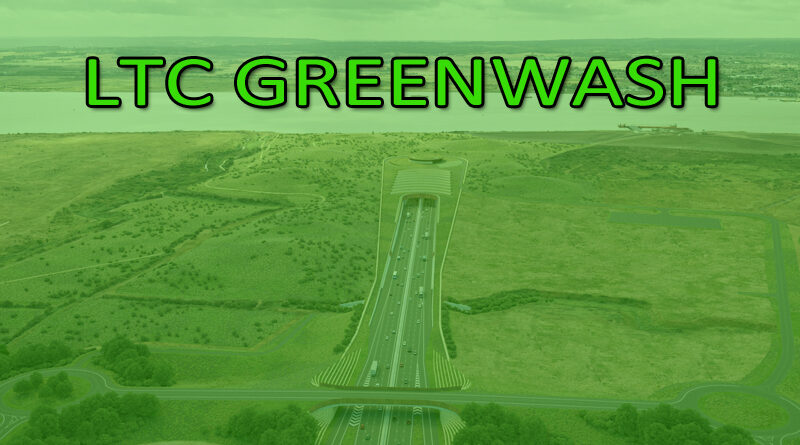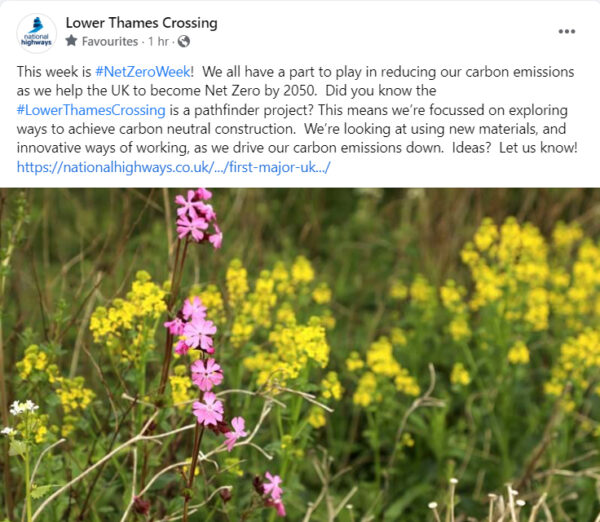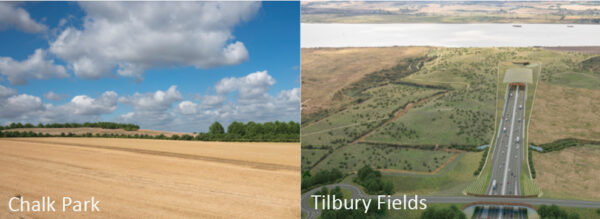LTC greenwash
It’s hardly surprising that with such a hugely destructive and harmful project like the proposed Lower Thames Crossing that National Highways are attempting to greenwash the project. It’s hard to keep up with all the greenwashing attempts, below are some of the highlights so far.
Latest greenwash propaganda – 18th July 2023
NH/LTC announced that Skanska are their preferred contractor for the Kent Roads contract for the LTC, if it goes ahead. Strangely the estimated cost of £600m (as at Sept 2021) has now evidently dropped to £450m.
NH/LTC also appeared to be claiming that the Skanska contract would further reduce the carbon emissions of the project, if it goes ahead. However, further investigation and questions from Highways revealed that in fact the carbon cut claims actually date back to 2020, so are not new at all. Just another attempt to greenwash the proposed LTC, and the estimated 6.6 million tonnes of carbon emissions.
Update – 10th July 2023
NH/LTC announced their aim to use hydrogen for construction machinery. However, it seems things may not be as they seem, and that this is just more propaganda and greenwash.
When we previously asked NH/LTC about how they intended to meet their claim of the LTC being the ‘greenest’ road every built in the UK, if it goes ahead, they had told us they are exploring removing diesel from their work sites by only using hydrogen and electric power plant. Yet their statement about using hydrogen COULD displace over ONE THIRD of the diesel forecast to be used during construction.
Our update on LTC and hydrogen covers this aspect of the proposed LTC a bit more, including the question of how much more the proposed LTC would cost if greener construction, such as using hydrogen and hydrogen machinery, was taken into account.
In response to our comments and calling them out on greenwashing NH/LTC responded to industry publication New Civil Engineer claiming that the use of hydrogen had already been factored the cost into the LTC DCO application, so the price would not increase.
If that is the case then their claims of further reducing the carbon emissions cannot also be true, as they too should be factored into the LTC DCO application. Therefore the estimated 6.6 million tonnes of carbon is still huge and not compliant with Net Zero legislation. You may also remember that in December 2022 (after the DCO application had been resubmitted) it was revealed that an NH/LTC boss had stated that if carbon emission were not resolved the LTC would not go ahead. The lack of transparency and evidence to back up their claims is unreal, and something we hope the Planning Inspectorate and others will be examining thoroughly.
They also published their first LTC Sustainability Report, which as you will see in our update we file firmly under greenwashing and propaganda.
Update – 25th January 2023
Highways Magazine have helped expose further evidence of greenwashing attempts, as National Highways/LTC and contractor Balfour Beatty’s carbon reduction claims fade under questioning. Read more.
Update – 13th December 2022
National Highways(NH) published an update stating that NH are the first roads organisation in the world to achieve global carbon management standard, PAS 2080, and that LTC has also achieved the same accreditation in its own right.
The proposed LTC is estimated to emit around 6.6 million tonnes of carbon, if it goes ahead. Just a few days before this PA 2080 update was released an NH boss stated that the proposed LTC will not go ahead unless they can resolve the carbon issues. This just goes to show what nonsense this latest NH greenwash attempt is, and also questions the credibility of the PAS 2080 accreditation.
Update – 13 October 2022
On 13th October 2022 National Highways announced a new LTC ‘Carbon Academy’. They claimed it would leave a legacy of green skills, helping the region become a world-leader in low-carbon construction. Also, that 45% of employees would be recruited from within 20-miles of the project, that it would champion local businesses, and spend £1 in every £3 of the construction budget with SMEs.
Who’s to say that there would be enough employees within a 20 mile radius, or that there are the right SMEs in the area who would want to be a part of such a hugely destructive and harmful project. Even with the delay to the start of construction, if permission is granted, would there really be time to train new staff up to an acceptable and adequate level of expertise for the jobs? The reality is that there is no evidence to back such claims as are being made, and there are no guarantees that any of this would actually happen, it’s just more propaganda and greenwash.
Update- 18th July 2022
On 18th July 2022 National Highways issued new claims about the carbon emissions of the proposed LTC being reduced by 80%.
Yet as we highlighted in our update, far from showing an 80% reduction their press release figures actually showed a whopping 67% increase in the estimated traffic carbon emissions. The actual total estimated carbon emissions when you add in those from construction and maintenance etc now stands at over 7 million tonnes of carbon.
Yet another attempt by NH to try and put a spin on the realities of the proposed LTC with yet more greenwashing.
Update – 4th July 2022
National Highways are today attempting to associate the proposed LTC, a project that (at the time this claim was made) is estimated to emit over 5 million tonnes of carbon emissions, to #NetZeroWeek. Do they have no shame?
Update – 28 June 2022
In this greenwash installment they are attempting to greenwash with a 1 million trees target for the proposed LTC.
Their own headline on their media release update stating:
“A community woodland and two public parks among 400 hectares of ‘landscape scale’ woodland creation planned with Natural England”
Let’s just take a quick look at the latest artist impressions of the two public ‘parks‘ (also known as spoil dumping sites) and see how many trees we can spot.
Not a huge amount of trees.
And a community woodland? Well that would be their proposed Hole Farm Community Woodland, which they’ve attempted to use to greenwash the LTC with previously.
You may remember they originally bought Hole Farm as part of their plans to ‘improve’ biodiversity alongside their major routes, in this instance the M25. They have said it will go ahead regardless of whether they are granted permission for the LTC or not. At the time of their first attempt of greenwashing with Hole Farm the site wasn’t even within the LTC development boundary.
However, it was added to the LTC development boundary as part of the Local Refinement Consultation as one of a number of nitrogen deposition compensation sites.
Remember compensation is not the same as mitigation. Mitigation is when you do something to minimise the impacts and harm. Compensation is when they can’t minimise the impacts so make a gesture to acknowledge the harm that is caused.
In this instance the harm comes from nasty nitrogen pollution as a direct result of the traffic associated with the proposed LTC.
Back on the topic of Hole Farm being used as a nitrogen deposition compensation site, and part of the tree planting target for LTC. As has been stated on numerous occasions by NH, and something they still stand by as our questions to them on the topic during the recent consultation proves, their proposal for Hole Farm Community Woodland will be progressed, by means of a planning application to Brentwood Council later this year, regardless of whether the proposed LTC goes ahead or not.
In a recent email response NH/LTC told us:
“Hole Farm Community Woodland is progressing independently of the Lower Thames Crossing and the masterplan for the site is the subject of a separate planning application and we are hosting a period of community engagement on our plans. National Highways has committed to delivering the Hole Farm Community Woodland masterplan subject to the associated facilities receiving planning permission from Brentwood Council. We provide further details of our emerging proposals for the site on pages 133 and 157 of the Guide. The land at Hole Farm would perform three functions of providing a community woodland, improvements in biodiversity, and compensation for nitrogen that will be deposited on sensitive sites from the operation of LTC.”
With that in mind we deem it to be extremely creative accounting for them to be attempting to claim Hole Farm as part of the LTC project or part of the compensation and tree planting target claims.
Impacts on agricultural land
As the name suggests Hole Farm was a working farm before NH got their hands on it. The proposed LTC is also estimated to destroy and impact thousands of acres of agricultural land.
Not only that, the other additional nitrogen deposition land recently added to the development boundary is also largely agricultural land.
M2 corridor and Blue Bell Hill – 104 hectares of agricultural land
Gravesham and Shorne Woods – 55 hectares of agricultural land
Thurrock – 45 hectares a section of which is agricultural land
And this is at a time of serious food security concerns, so hardly a time to be considering destroying so much of our valuable agricultural land. Especially not for such a hugely destructive and harmful project that meets none of the project objectives, and is not fit for purpose.
Epping Forest Special Area of Conservation
In addition, within this latest greenwash NH are using comments from Natural England to try and add weight to their claims. Yet it should be remembered in the Local Refinement Consultation it was stated that Natural England and others do not agree with NH’s assessment on nitrogen deposition impacts, particularly in regard to Epping Forest Special Area Conservation.
Greenest Road ever built in the UK
NH have also previously attempted to greenwash the LTC with claims it would be the greenest road every built in the UK. Admittedly the bar on that is pretty low, but short of painting the whole thing green we can’t see it happening.
Who knows maybe next up will be the ‘LTC Greenest Road Consultation’ to ask us which shade of green they should paint it! And based on the inadequacies of previous consultations we imagine the colour palette provided to pick our favourite shade of green would likely contain typical tarmac shades of blacks and greys!
The greenest road claims would of course also see an increase in the already extortionate £8.2bn and rising financial cost, not to mention the huge and unacceptable cost to the environment and our health and wellbeing.
TCAG reaction
“You cannot talk about caring for the natural environment whilst proposing such a hugely destructive and harmful road project. Much of the land where they are proposing to plant these trees is agricultural land that they want to take for compensation for the harmful nitrogen pollution the project would cause. This is not mitigation, when you minimise the impacts, this is compensation, when you acknowledge the damage that has been done, because they can’t find a way to minimise or stop the pollution. It also increases the thousands of acres of farmland that would be lost if the LTC goes ahead, at a time of major food security concerns.
A huge chunk of this proposed compensation land is at Hole Farm, near Great Warley, which National Highways have already publicly stated is part of their national plans to ‘improve’ biodiversity along their major routes, in this instance the M25. Since they have stated these plans are going ahead regardless of whether the LTC gets permission, they should not be counted as part of the LTC project, It is creative accounting and yet more greenwash nonsense.”
Related
LTC Carbon Emissions – click here
National Highways – Government decarbonisation plans drive down projected carbon emissions from the Lower Thames Crossing by 80% – click here
Highways Magazine – LTC ‘greenwashing’ row over claims of 80% emissions cut (July 2022) – click here
National Highways – One million trees target for LTC – click here
BBC Essex Radio – LTC/NH Emily Dawson – click here
Hole Farm nothing to do with LTC – click here
LTC Road to Net Zero summit – click here



